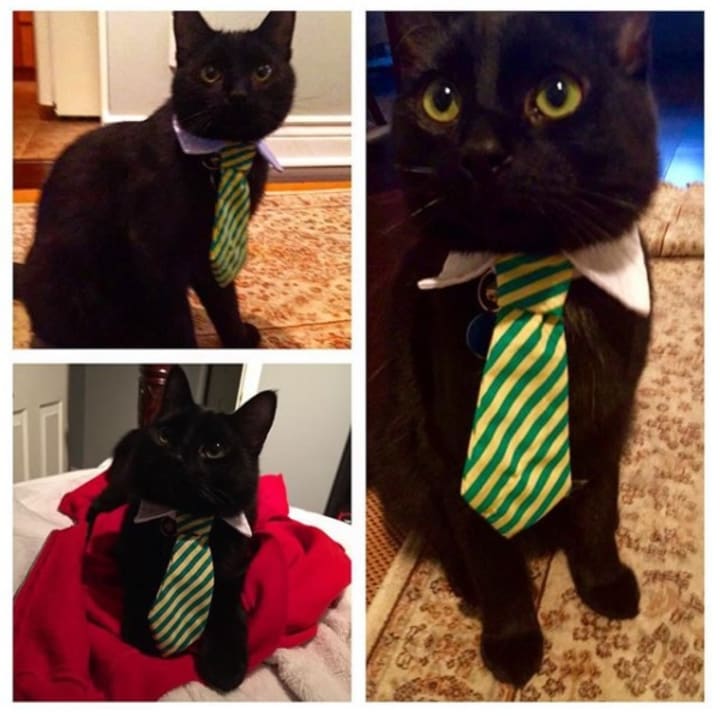The Complete A-Z Guide to Being a Cat Owner
A Helpful Guide to Being a Responsible Cat Parent

Despite the common misconception that cats are completely independent, cats actually take a lot of work. But it doesn't have to be difficult to keep your cat healthy and happy.
As a proud cat mama to two beautiful felines (Misty and Simon, pictured at the top and bottom of this article) I've put a guide together to help you be the very best cat owner you can be.
A — Affection
Make sure to give your cats lots of affection. You can do this a number of ways, including petting it and cuddling with it whenever it wants to. It may seem silly, but even talking to your cat can make it happy, too. Every cat prefers different amounts of affection, so once you get to know your cat, you can decide how best to give it your attention.
B — Be Patient
This point is especially important for brand new cat owners. Some cats, especially cats that don't know you very well yet, can act out. A lot of the times you don't know where the cat has been or what sorts of environments your new furry friend had to live in before you got them. They could have had a traumatic experience, or have been abused by a previous owner. Being patient with your cat can include leaving it alone at first to come to you by itself when it's comfortable, or introducing another new cat to it very slowly.
C — Change the litter box daily.
Picture yourself as a cat for a moment — You have to go to the bathroom, so you make your way to your litter box and find out that it's dirty so you have to root around your own old feces. Not a very pleasant thought, is it? Not changing the litter box everyday can also cause your house to smell, so do yourself AND your cat a favour and keep it clean. Every couple of weeks or so you should also empty everything out of the box and clean it thoroughly to keep it even cleaner and less smelly.
D — Don't declaw your cat!
Not being able to be scratched by a cat may sound good to you, but it's declawing is not like a manicure; it is a painful and serious surgery for your cat. Declawing is an operation to remove an animal's claws surgically by means of amputating an important part of their anatomy. It alters the conformation of their feet and also deprives your fur baby of its primary means of defense, leaving it prey to predators if it ever escapes to the outdoors.
E — Every Cat is Different
Cats are picky creatures and, just like people, every cat has a different personality, as well as different wants and needs. Some cats need affection to the point of never leaving your side, and other cats like to be on their own and only show up every now and again. Some cats demand you to play for hours and others prefer to play by themselves. Some cats prefer wet food over dry food and others prefer a laser pointer to a feather wand. An important part of being a cat owner is to get to know your cat, and what it wants and needs, to be the happiest it can be.
F — Feed Your Cat
This one sounds obvious, but there's a bit more to feeding a cat than meets the eye. Make sure to feed your cats quality food. Do your research and make sure the food's ingredients say more than just "meat." Asking your veterinarian to recommend a food is a good idea. It's also important to make sure your cat gets the appropriate amount of food for its weight. Check the can or bag of food and weigh your cat (an easy way to do this is to weigh yourself first, then pick up your cat and the added weight is how much your cat weighs) then feed it according to how much it weighs. If you notice your cat doesn't eat much, you can alter the amount of food once you determine its eating habits.
G — Groom Your Cat
Keep your cat's coat nice and shiny by brushing your cat as often as possible. Brushing your cat not only reduces the amount of hair shed all over your house, but also keeps your cat looking smooth and its coat looking shiny. Some cats don't like to be brushed, so having treats to reward them for letting you brush them can be helpful.
H — Hospital
Know where your nearest emergency animal hospital is. You may think you'll never have to take your cat to a hospital in its lifetime, but anything can happen. Make sure you also save up money and put it aside in case you ever have to go to an emergency hospital, as it can be very expensive. It never hurts to be prepared.
I — Indoor vs. Outdoor
Like many other cat owners, you may feel guilty about keeping your cat inside, and worry that you're depriving your cat of natural instincts or fresh air and sunshine. You may have even thought about letting your cat go outside, but this part of the article may make you think twice. According to The American Feral Cat Coalition, there are approximately 60 million feral and homeless cats living in the streets. Many of these stray cats can carry diseases that can be passed on to your domestic cat if they come into contact with them. These diseases can be serious and in some cases fatal, such as feline leukemia, feline AIDS and FIP (Feline Infectious Peritonitis). There are also safety concerns with letting your cat outside. Your cat could be hit by a car or attacked by loose dogs or other wild animals. There are also many plants that are toxic to cats.
J — Jealousy Towards New Cats
This one is for those of you who may be getting a new companion for your cat. Or perhaps you already have and that's why you've stumbled upon this article! Bringing a new cat home can be a trying time for the existing cat(s), the new cat, and you, the cat owner. Cats can show jealousy a number of ways, including hissing, growling, or swatting at the new arrival. You may also notice a change in their overall behaviour — They may eat less, or become extra needy. Make sure when you bring a new cat home you keep it in a room by itself and be very slow about introducing the new cat to your existing cat(s). Make sure you always give all of your cats equal attention and keep an eye out for any jealous behaviour.
K — Keep cats away from human food
Here's a list of 7 foods to keep away from your cats at all times:
- Chocolate — Ingestion of chocolate can cause heart problems, muscle tremors, or seizures. Chocolate also contains caffeine, which is a no-no.
- Alcohol — As little as a tablespoon of alcohol can lead to problems for your cat. It can cause severe liver and brain damage.
- Coffee, tea and energy drinks — As previously mentioned, caffeine is dangerous as it can cause your cat to become restless, suffer from rapid breathing, heart palpitations and muscle tremors.
- Fat trimmings, raw fish, raw eggs and raw meat — Any of these can cause vomiting, diarrhea or a painful condition, called pancreatitis (from excessive fat).
- Dairy products — A lot of people think giving cats milk is a good thing, but a lot of cats are lactose intolerant and could get vomiting and diarrhea if they have dairy.
- Onions and garlic — All members of the onion family can cause problems. including digestive issues. Eating some type of onion on a regular basis could also lead to anemia.
- Grapes and raisins — Both of these can cause acute kidney failure in cats.
L — Learning More About Cats
There are tons of resources available online and in books about how to best care for your cat. Researching common mistakes cat owners make and reading care guides is an important part of being a responsible pet owner. In fact, right now, reading this guide is following this step — Congratulations on being a good person that wants to give their cats the very best life possible.
M — Meow?
After birds, cats have the widest range of vocalizations of any other domestic pet. Not all meows are the same — Some meows express contentment and ease, while others stress worry, anger, or even fear. Knowing the different noises your cat makes can better help you to understand them. (Fun fact: "Meow" is the most commonly-heard sound that cats make, but did you know the meow of an adult cat is almost exclusively used to communicate with humans, and not other cats?)
N — Nail Trimming
There are actually a lot of different reasons why it’s a good idea to keep your cat's nails short, and limiting your cat’s ability to scratch at your furniture is only one of them. Clipping your cat's nails can prevent painful broken claws and ingrown nails. Keeping your cat's nails short makes life more comfortable for both your cat AND you. If your cat likes to knead you (and in the process pokes their sharp nails into your skin while doing so) you know exactly what I’m talking about.
O — Obesity in Cats
It's important to maintain a healthy weight with your cat and not let it put on too much weight. Obesity in cats can lead to diabetes and arthritis and many other health issues. Putting a cat on a diet or planning weight loss for your cat is hard work and needs to be done very carefully. The first step is to have a veterinarian assess the situation and follow their directions. They may prescribe a special weight-loss food or give you tips on how to exercise your cat.
P — Play with Your Cat
There are a number of ways you can play with your cat. There's the classic laser pointer, feather wands, spring toys, and catnip toys. Play for a few short sessions every day and always allow your cat to catch and grab the toy at the end of each game so that it feels like it's victorious. Exercise from playing helps your cat maintain a healthy weight. Playing is also a way for your cat to release aggression and stress, and it can also strengthen the bond between you and your cat. But if your cat is tired or not in the mood, make sure you never force your cat to play.
Q — Quality of Life
This might be pretty tough for some people to read, but there will come a time when your cat gets old or sick, and you need to determine its quality of life. No pet owner wants to put an animal down, but it can be even tougher to see a beloved pet suffer, and it's not fair to your cat to keep it in pain. Talk to your vet if you worry your cat's quality of life is in jeopardy and see if there's anything that can be done. This is the absolute toughest decision pet owners face, and there are many helpful resources online to help guide you.
R — Remember to get your cat's teeth checked.
Dental disease is quite common in cats, especially as they age. It can be painful and seriously affect your cat’s health. Bacteria from poor teeth hygiene can get into the cat’s bloodstream and seriously affect its heart and kidneys. Pain associated with dental disease may be shown by your cat pawing at their mouth or shaking their head, but most cats do not display signs of dental disease even though they are in pain. Make sure your veterinarian checks your cat's teeth at every check-up.
S — Supervise Cats on Catnip
Most cats absolutely adore catnip. It often makes them giddy, ecstatic and playful. The use of catnip can inspire movement and exercise after long periods of rest. All of this sounds great right? Well, researchers have found the closest human equivalent to catnip could be the hallucinogen LSD (though the effects usually only last about 15 minutes), so it's important to keep your cat supervised whenever they are on catnip. This ensures that your cat doesn't fall, knock things down, or hurt themselves while they're enjoying the experience. There are also some cats that don't enjoy catnip and have bad reactions to it. When first introducing catnip to a cat, use a very small dose and monitor how they handle it.
T — Toxic Plants
This may come as a shock to some, but a LOT of plants are highly toxic to cats. There are the odd exceptions (catnip and catmint, to name a couple), but you always want to do your research before buying or growing a plant in your home. Cats love to chew on plants. and it can be difficult to keep plants out of their reach. If a plant is poisonous, it's better to assume that all parts of the plant are poisonous — even though some parts of the plant may have higher concentrations of toxic matter than others. Toxic plants can cause inflammation of the skin, mouth and stomach, while other plants can be fatal. If you see your cat eating a plant and you are uncertain if it is poisonous, call the pet poison hotline or seek immediate care by a veterinarian.
U — Understand the Difference Between Playing and Fighting
This one is mostly for cat owners that have multiple cats. Play aggression or mock fighting is normal behaviour for cats, but it can be hard to tell at times if your cats are simply playing or if they're actually fighting. Cats may be smaller than a lot of other animals, but they have some serious weapons in the shape of teeth and razor-sharp claws. It's important to monitor play at all times between cats if possible, and never let your cats get into a real fight.
V - Veterinarian
Yes, the dreaded "V" word almost every cat hates. If your cats are anything like mine, the second they see me bringing out the carrying crate, they hide. Your cat may not like vets, but regular examinations are a necessity for keeping cats healthy. Cats are masters of disguise when it comes to hiding pain or illness from you, but vets will be able to know if there's something wrong. According to the American Veterinary Medical Association, 9.6% of cat owners do not take their cat to the veterinarian at all, and 27.1% only visit when their cat is sick. In the same survey, only 75% of cat owners feel routine check-ups are either very or somewhat important for their cat (this is compared to 90% for dog owners).
W — Water
Make sure you keep your cat's water bowl filled. If you have multiple cats, make sure you have as many water bowls as you do cats, and make sure you keep one on every level. Just like humans, water is necessary for your cat's digestion. Cats who eat dry food will typically need 10 times more water than those who eat unprocessed or raw food.
X — X-tra treats, please!
I figured X would be a tough one to come up with a title for, and I was right, but I need to put in a section about treats so this is it! Giving treats to your cat has many advantages. It can help train your cat or help your feline fight stress. There are even treats that keep your cat's teeth clean. You'll want to give your cats high-quality treats by doing research about different brands and seeing what treats your cat loves the most. Just make sure you don't overfeed them, or else you'll have to come back to this article and read the section on "Obesity."
Y — "You want to do WHAT to me?" Spaying and neutering your cat.
Unless you plan to use your cat for breeding, it’s best to have your kitty spayed or neutered. It's not just to help control the pet population (thanks, Bob Barker), but cats that are spayed or neutered also generally have better behaviour. It can also avoid infections and cancers. Cats can get pregnant as early as four to six months of age, so make sure to spay or neuter your cat before they get too old.
Z-Zzz — Why does my cat sleep so much?
Your cat is sleeping all the time, is there any cause for concern? Don't worry, cats can sleep anywhere from 16 to 20 hours a day, and the average cat will spend at least two-thirds of their life sleeping. Cats are crepuscular — which means that they are most active during the twilight hours of dawn and dusk. Cats don't sleep the same way we do, though. Three quarters of the time cats spend sleeping is what we might call snoozing—Cats can get all the rest they need while snoozing, but they’re still alert enough to awaken at a moment’s notice.

Author's cat: Simon
About the Creator
Veronica Thor
Veronica is a freelance writer from Toronto. Passionate about cats, astronomy, painting, comedy and beauty.






Comments
There are no comments for this story
Be the first to respond and start the conversation.